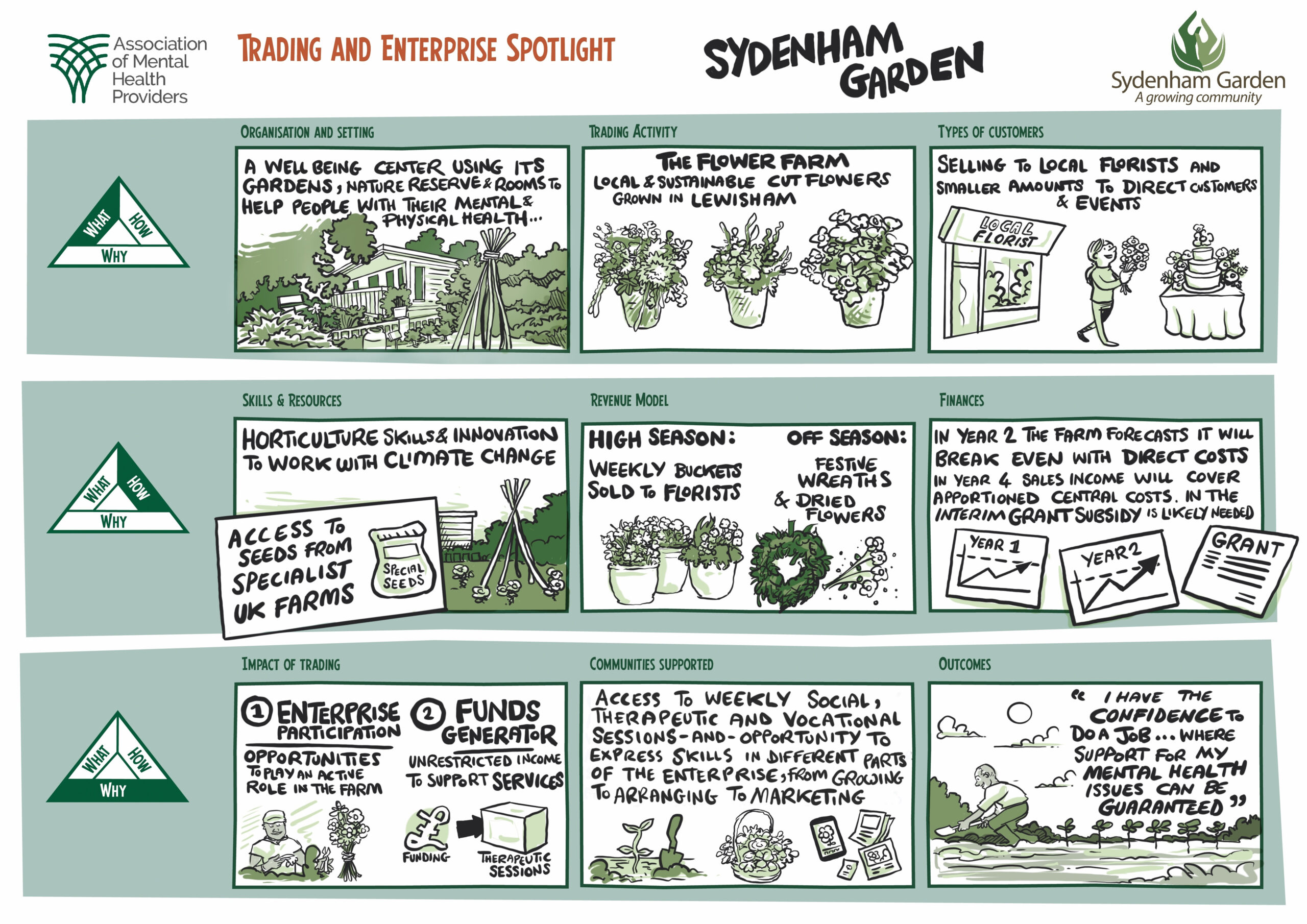Sydenham Garden
The journey so far
Sydenham Garden approached the Enterprise Development Programme in the early stages of trading. It was growing flowers on an ad-hoc and small scale, with one regular wholesale customer - a local florist. However, the organisation already had a substantial and growing following on social media and some relationships with potential additional Florist customers. So, with cut flowers becoming an in-demand product, it felt like an ideal time to fully launch Flower Farm operations to capitalise on the recent interest. The main barrier to fully launching the Flower Farm was capacity, from a strategic / development perspective but also operationally. The organisation felt with this added, their customer base could quickly increase five-fold.
During the programme, the organisation benefitted from a combination of a grant, access to a peer networking group and learning workshops, plus some financial management expertise. The grant was utilised to support additional staff capacity, buy in website and marketing consultancy services and also budget to invest in stock and operational equipment. Reflecting on the programme’s support, David, the organisation’s lead for the Flower Farm enterprise, shared that although the financial support was obviously very helpful, “the most useful parts of the EDP were the training and mentoring. It was great to have access to such a wealth and range of expertise and experience.”
The expertise valued varied from marketing-focused sessions to business model reviews. The former led to a negative being turned into a positive. "They reframed our limited admin capacity and particularly phone answering support as actually showing that we were a small, local business who prioritised growing great flowers and working with our beneficiaries over 24/7 customer service." The latter resulted in fresh ideas of how to increase sales whilst keeping costs to a minimum. "We're now considering some sales campaigns where we market to our local neighbourhood, one/two streets at a time. This could increase sales income with minimized delivery costs." Additionally, the peer-to-peer sessions were highly valued, where insights offered by the facilitator and other trading organisations "made all the day-to-day challenges seem achievable."
Financial impact
The overarching goals of the Flower Farm enterprise are to aid the sustainability of the organisation with unrestricted income but also to build an operation which gives an employment/re-employment pathway for those with mental ill-health (through the operations of the enterprise).
In its first full year, Sydenham Garden generated just below £9k of trading income, an increase on previous years. This was below the initial targets set, mainly due to challenges of supply affected by Climate Change and also some operational challenges around the suitability of compost used. However, the organisation feel confident about the foundations they’ve set for next year’s high season. “With the extra time freed up for me, I was able to spend time creating our business plan, marketing plans, customer journey diagrams and financial forecasting. These documents have given us a clear, defined, and communicable structure on which to build the enterprise moving forward.”
Importantly, on an operational level, the team have consciously observed and researched what crops and horticultural techniques have and haven’t worked in unpredictable and changing climates. This learning has been installed into their annual crop plan for next year with the goal of growing a more resilient selection of flowers. With this informed plan, the organisation's aim is to generate revenue which sees them break even operationally (i.e. covering costs of delivery; supported employee wage, growing resources, seeds). For the next two years at least, it is anticipated that a grant will be needed to support costs such as apportioned central costs and staff time given to supporting the supported employee.
What would you do differently?
On reflection of the journey travelled to date, David commented: “I’d be more careful to distinguish between urgent and important. An example of this would be that I wish I had spent more time and consideration getting the branding sorted. I think I ended up doing it quickly because there were things that seemed more pressing, whilst the branding seemed like a bit of luxury. With hindsight, I could have let some of them slip as the branding was actually very important. It’s really important to give yourself time to do the bits that take time and consideration. It will pay off in the long run.”
Moving forward
The organisation is focused on maximising income in next year's high season for the Flower Farm by (1) using its plans for a more resilient crop selection and (2) building more wholesale florist relationships to provide recurring revenue.
In parallel, the organisation will be considering how it can take advantage of individuals and event customers and if and how they generate more revenue in the off seasons through items such as festive wreaths and wedding favours. The extent to which these areas develop is likely to impact whether Sydenham Garden could consider the employment of a second supported employee per year.
Although the growth of trading income is an objective, there is an agreed understanding across the organisation that they don't want the Farm to grow "too big" and detract from their core mission. It is felt a large and very commercial operation is likely to bring with it an environment and culture which is the opposite of the calm and community feel of the current site. In turn, it's unlikely trading income will ever be the main source of income. However, regardless, it is still felt the Farm can have a double-win of providing some useful unrestricted income that can be used flexibly and an activity that enhances the experience of their co-workers.
You can keep up to date with Sydenham Garden's latest work and read more about their important impact below:



